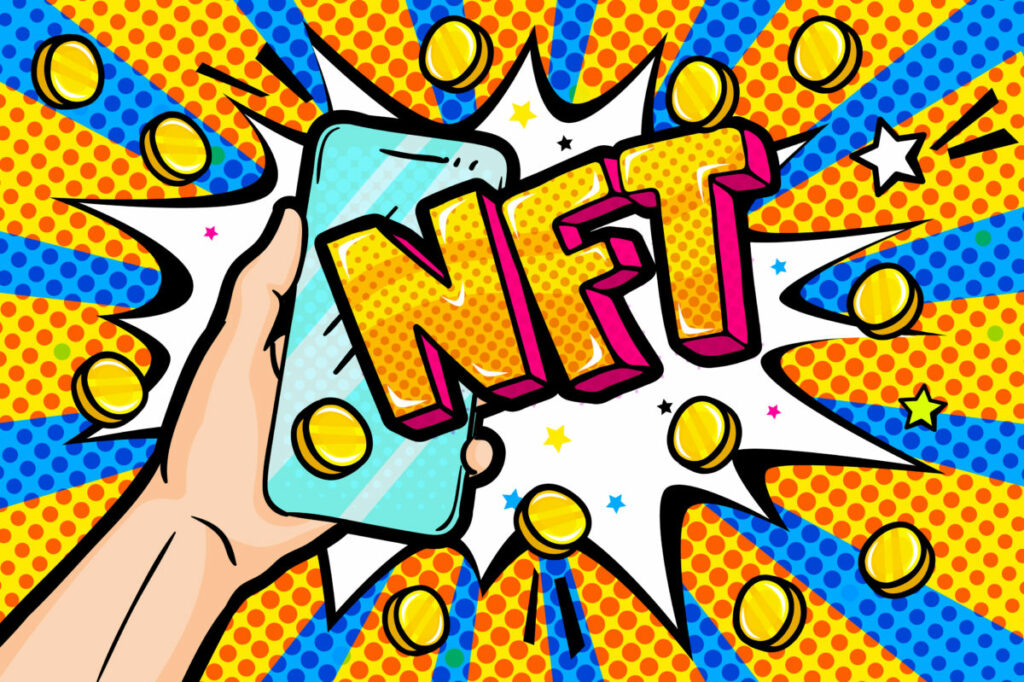It seems like you can’t go anywhere these days without hearing about the ever-mysterious world of NFTs. But what the heck is an NFT, anyway?! In this week’s Arora Blog, we’re offering a beginner’s level crash course that might just inspire you to invest.

Let’s play a game of word association. Are you ready?
DIGITAL MEDIA
What was the first thing that jumped to your mind? Was it a YouTube video? A TikTok? The collection of memes you have saved to your phone? Your hidden Pinterest board where you save recipes and crafts you’ll never make (or fail miserably attempting)?
Regardless of what you think of, chances are it’s probably something on the internet that you’ve accessed for free, anytime you wanted. That’s the internet world we’ve come to know and love.
But recently, new technologies have been used to make those same pieces of free digital media sellable, and a market has emerged for them to be sold and traded. These sellable pieces are called NFTs (non-fungible tokens), and they’ve raised questions about what constitutes value…and the ethics behind selling non-tangible goods.
But First…A Glossary
Considering that NFTs are a brand new concept, the terminology surrounding them is difficult to grasp at best (and hellishly ambiguous at worst).
Since we’re delving deep into a subject that goes over most people’s heads—including our own, at times—we think the best way to start is by defining common terms.
Blockchain: A blockchain is a transaction of digital records. Individual records, called blocks, are linked together in a centralized list, called a chain. Blockchains are used to record transactions made with cryptocurrencies in order to verify the validity of the transaction.
Cryptocurrency: Otherwise known as crypto, this virtual currency is secured by cryptography and designed for individual ownership records to be stored in a computerised database. Cryptocurrency is not issued by any government body, which makes them immune to interference or manipulation from potential government upheaval.
Discord: The go-to instant messaging platform for discussing NFTs.
Ethereum: The main blockchain platform for creating and minting NFTs due to having smart contract functionality.
Fractional ownership: Partial ownership rights over an NFT, created so buyers without means can still purchase.
Fungibility: In the simplest terms, replaceability. Something like money is fungible because a dollar is not unique (i.e. a US dollar owed can be repaid with any other US dollar). For something to be non-fungible, it must be one-of-a-kind, such as a painting.
Gas fees: Fees paid to a specific blockchain to pay for the costs of minting an asset.
Metadata: The collection of unique data that defines ownership and differentiates one NFT from another.
Metaverse: A virtual 3D world where people can interact. These include virtual gaming worlds where users can buy and sell land as NFTs.
Minting: The process by which an NFT becomes part of the blockchain to ensure traceability. Once an asset is put on the blockchain, it is “minted” as a token and cannot be altered.
OpenSea: The first and largest NFT marketplace, boasting more than four million assets.
Royalties: Money earned by an NFT creator through the resale of the token. Some NFTs automatically pay royalties each time an NFT is sold.
Solidity: A high-level programming language for writing smart contracts. This language is ideal for Ethereum, which hosts most NFTs.
Smart contracts: These define the rules and regulations all trading, spending, and token creation transactions must comply with on the contract’s blockchain platform.
Token standards: Rules and regulations defined by the blockchain platform guiding NFT creators, traders, and distributors on acceptable practices. A few notable examples include ERC-721 which governs the creation of NFTs, and ERC-20 which is used to mint fungible tokens.
Okay, that was a lot to read and absorb, but even just these base-level definitions will assist you in navigating the world of NFTs. So stay with us! There’s more to come on this journey to understanding how NFTs are shaking up industries left and right.
So…Are NFTs Even Valuable?!
Oh, we don’t know. Is the original copy of the Declaration of Independence valuable?
Honestly, we aren’t being facetious—that’s actually a relevant comparison.
Think of it this way: The original copy of the Declaration of Independence holds value because it’s the only one. Are there copies of it? Of course! You can find pictures of it with a simple Google search, or realistic looking replicas in the National Archives gift shop. But those don’t have true value, because they aren’t the real thing.
In the same way, NFTs can be valuable because they provide proof of ownership of the genuine original of a digital asset. NFTs are essentially worth what people will pay for them, which you’ll see can be a tremendous amount.
What Exactly Do You Get When You Buy an NFT?
Just like everything about NFTs, the answer to this question isn’t a simple one.
Some NFT cynics argue that an NFT purchase amounts to a worthless internet trophy, or even just clout or bragging rights.
And while that may seem true, you’re also purchasing a kind of certificate of authenticity that proves a certain version of something is uniquely yours, just like an art collector might purchase a piece of art.
It should be noted that when buying an NFT, you wouldn’t actually be getting the copyright or trademark to the digital asset you purchased. And it’s also worth noting that owning an NFT doesn’t mean there aren’t still limitless versions of your digital asset floating around on the internet. Such is the nature of the beast: once something is posted digitally, infinite copies of it live on in perpetuity.
In the most basic terms, buying an NFT means you’re paying to own a potentially-valuable digital original of an asset. As noted above, its value stems directly from what someone would pay for it—which, in 2022, could literally be millions of dollars.
What are the Risks?
As with any investment, including homes, stocks, or equity, there’s an ever-present chance that its value will plummet with little or no warning. An NFT purchased for a million dollars is subject to the whims of its market just like anything else.
However, NFT enthusiasts believe that the scarcity of the assets will hold value (remember that the Declaration of Independence will always be valuable because it’s the original) as long as there is interest in owning unique digital assets.
NFTs also have a higher-than-ideal risk to our environment. Blockchain operations require massive amounts of computing power. In fact, some estimates show a single crypto transaction uses more power than an average US household uses in a day.
What are Some of The Most Expensive NFTs?
The current NFT market is estimated to be around $3 billion and is growing rapidly every single day, thanks in part to these multi-million-dollar NFT sales. To date, the five most expensive NFTs ever sold are as follows*:
- Pak’s digital artwork “The Merge” which sold for $91.8 million
- Beeple’s digital artwork “The First 5,000 Days” which sold for $69.3 million
- Beeple’s digital artwork “Human One” which sold for $28.9 million
- Digital collectible “CryptoPunk #7523” which sold for $11.75 million
- Digital collectible “CryptoPunk #3100” which sold for $7.58 million
- Digital collectible “CryptoPunk #7804” which sold for $7.57 million
*The price of these NFTs is listed in the cryptocurrency used to purchase the asset, and is based on the price of the cryptocurrency at the time of purchase.
Can Anyone Make NFTs?
Absolutely! The beauty of the crypto market is in its inclusivity. And while anyone can theoretically create, mint, and sell an NFT, there are still rules that must be followed. NFT trading sites have platform-specific guidelines, which might include gas fees, approvals from existing creators, review checks, and smart contracts.
Should I Invest in NFTs?
As we noted above, investing in anything is inherently risky because there is no guarantee of return. But we’re in the equity crowdfunding world, baby! Risk is what sets our souls on fire, because of the fact that it can, and does, pay off. As far as we’re concerned, risk is the spice of life.
Does that mean you should get a second mortgage on your house to buy an NFT you think will explode? Absolutely not. But if you have some liquid cash you’d like to invest, and you see an NFT you believe could potentially sell for a profit, who are we to tell you not to?*
*Arora Project is not a financial advisory firm, and our editorial team does not moonlight as investment moguls. Take our advice at your own risk.
Are You Still With Us?
Phew! We made it! That crash course wasn’t so bad, was it?
As you can see, NFTs aren’t so hard to understand after all. And, regardless of whether you believe NFTs have value or not, the market for them is booming—all signs point to NFTs being around for the long term.
Are you a startup founder looking to launch an equity crowdfunding campaign? Want someone to guide you through your launch just like we did through the world of NFTs? Apply to be an Arora Republic partner, and let’s get your campaign where you want it to be.








